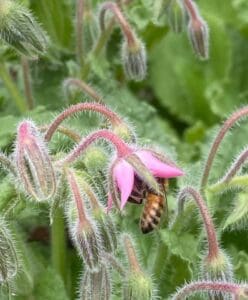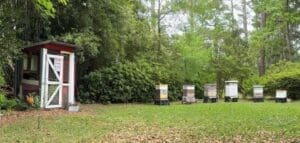World Bee Day is May 20th, this day aims to raise awareness on the importance of pollinators and share the contributions to sustainable development.
Bees play an indispensable role in the health of ecosystems and agriculture through pollination, a service integral to the reproduction of many plants and the production of fruits and vegetables. As they forage for nectar and pollen, bees inadvertently transfer pollen from the male parts of flowers to the female parts, enabling fertilization. This natural process is not only crucial for the growth of wild plants, which contribute to healthy ecosystems by providing habitats and food for numerous species, but also supports agricultural crops that are vital for human nutrition.
Without bees’ tireless work, many plant species could face reduced fertility or even extinction, leading to decreased biodiversity and severe impacts on global food security. The decline in bee populations threatens this delicate balance, underscoring the need to protect these vital pollinators to maintain ecosystem health and agricultural productivity.
The decline of bee populations is attributed to a complex interplay of factors, with habitat loss, pesticide use, climate change, and disease playing pivotal roles. The expansion of urban areas and intensive agricultural practices have significantly reduced the natural habitats bees rely on for food and nesting. Concurrently, the widespread application of pesticides in agriculture has been detrimental to their health and survival, often disrupting their navigational abilities and weakening their immune systems.

To learn more about bees and how we can help them thrive we contacted bee hobbyist Jan Quattlebaum in Savannah, GA to get her input.
Anderson Magazine (AM) – What are some of the best plants for Southerners to have to attract bees and help them thrive?
Jane Quattlebaum (JQ) – Any wildflower is wonderful for all pollinators. Daisies, clovers, azaleas, fruit flowers such as citrus or melons (and squash which is in the melon family). Bumbles pollinated tomatoes so those are great also.
AM – What is the biggest misconception about bees?
JQ – Well there are many varieties of bees but the honey bee is probably the one most often misunderstood. I have people say “I am scared of bees. I got stung by one as a child”. They most likely got stung by a wasp, yellow jacket or a bumble but not a honey bee. They only sting in self-defense or if they feel they need to defend themselves.
AM – Do you think bee houses help? Bee “baths”?
JQ – I’ve honestly never seen bees in one of those expensive beneficial houses but bumbles love a bird house and those buggers will chase you down if you disturb their nest.
AM – What’s the worst thing we do that has a negative effect on the bumble bee?
JQ – Ariel mosquito spraying hurts ALL pollinators but if they spray after dark, most pollinators are safely home for the night. Seven dust is absolutely awful on all bees and butterflies. If you must use pesticides, use granules and those that don’t go on the flower.
AM – Is there anything you’d like share with readers about bees?
JQ – I study and keep honey bees but all pollinators are important. There aren’t enough lines left in this article for me to share all that I’d love to share with you about honey bee.
Climate change further exacerbates these challenges by altering the timing of plant blooming periods, which can desynchronize the lifecycle events of bees that rely on these plants for sustenance. Additionally, bees are facing increased threats from diseases and parasites like the Varroa mite, which devastate colonies by spreading viruses and reducing bee immunity. These factors collectively contribute to the alarming decline in bee populations worldwide.

The decline of bee populations presents a dire threat to global agriculture and food supply, as bees play a crucial role in the pollination of many crops. Their diminishing numbers are causing a ripple effect that compromises the production of fruits, vegetables, nuts, and seeds—vital components of the human diet and agricultural economy. As bees become scarcer, the efficiency of pollination decreases, leading to reduced crop yields, lower quality produce, and ultimately an increase in food prices.
This scarcity not only affects the variety and availability of food but also jeopardizes the livelihoods of farmers who rely on these crops for income. The intricate balance of ecosystems is also disturbed, highlighting bees’ essential function in sustaining biodiversity critical for agricultural resilience. Therefore, protecting bee populations is not merely an environmental concern but a fundamental imperative to secure our global food supply chain.
To safeguard and nurture bee populations for a sustainable future, concerted efforts must revolve around creating and maintaining habitats that support their lifecycle. Initiating the cultivation of native plants and flowers in gardens and community spaces provides essential nourishment and shelter, ensuring bees have access to a diverse range of pollen and nectar sources year-round. Reducing pesticide usage or transitioning to bee-friendly alternatives plays a pivotal role in mitigating the detrimental impacts on bee health, offering them a safer environment to thrive.
Additionally, supporting local beekeepers like Quattlebaum and organic farms contributes directly to the vitality of bee populations by promoting practices that are harmonious with bee welfare. Encouraging educational programs and community involvement raises awareness about the importance of bees, fostering collective actions aimed at protecting these indispensable pollinators for generations to come.



